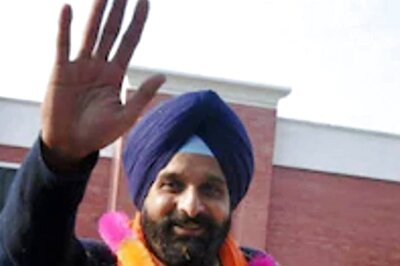
views
Ottawa: Justin Trudeau on Wednesday will officially kick off what is set to be a grueling campaign for a second term as he takes on surging rivals in Canada's October 21 national elections.
The prime minister is due to meet with Governor General Julie Payette at 10:00 am (1400 GMT) and ask her to dissolve parliament.
The election campaign can then officially begin, although political leaders and parties have already been wooing voters with pre-election ads, announcements and whistle stops in key battlegrounds across the country.
Elected in 2015, Trudeau and the Liberal Party will be battling to hold onto a majority in parliament against untested rivals Andrew Scheer of the Conservatives and New Democratic Party leader Jagmeet Singh, as well as the strengthening Greens led by Elizabeth May.
Voters will choose all 338 members of the House of Commons, with the latest poll on Tuesday showing the Liberals reclaiming a slight lead over the Tories.
Accusations of Trudeau meddling in a criminal prosecution sent the Liberals' popularity tumbling at the start of the year.
Climate change and affordability are widely predicted to be the main issues in the campaign.
The Canadian economy is strong, posting second-quarter growth of 3.7 percent and almost half a million new jobs created in the last year.
But the economic gains have not been widely felt, and Canadians have increasingly expressed concern about a rising cost of living.
The Bank of Canada also warned last week that the economy, facing international headwinds, will slow in the second half of the year, with economists worried about a prolonged trade war between the world's two biggest economies, the US and China.
Throughout his first term, Trudeau cast himself as a champion in the fight against global warming, while Scheer has vowed to roll back a federal carbon levy as his first act in office, if elected.
The Liberals over the past four years legalized cannabis, boosted Canada's resettlement of refugees, negotiated a new continental free trade deal with the US and Mexico, and concluded trade pacts with the EU and Pacific nations.
The Trudeau government also oversaw the largest military procurement in Canadian history, to replace aging warships and fighter jets.
But Trudeau's political agenda was often sidelined by crises, including diplomatic and trade rows with the US, India, Saudi Arabia and China.
China has detained two Canadian nationals in apparent retaliation for Canada's arrest of a Chinese tech executive on a US warrant.
As host of the 2018 G7 summit, Trudeau found himself the target of accusations of weakness and dishonesty by US President Donald Trump after the US suddenly pulled out of the joint final statement.
Nationalizing an oil pipeline to salvage the construction project after years of delays due to protests and legal challenges also drew the ire of environmental activists that year.
But Trudeau's golden boy image suffered the worst hit after he expelled from the Liberal Party two senior ministers — both women, one of them Canada's first indigenous attorney general — for criticizing his alleged meddling in the prosecution of engineering giant SNC-Lavalin to try to save jobs.
The move undercut his feminist appeal and soured reconciliation with indigenous peoples.
In recent months, the Liberals managed to claw back some of that lost support.
According to Mainstreet Research, the Liberals now have 38 percent support, versus 34 percent for the Tories. The survey of 1,876 Canadians was conducted from September 6 to 8, with a 2.3 percent margin of error.
The polling data also showed that the Green Party, with 11 percent support, could leapfrog the New Democrats at eight percent to claim third place in parliament for the first time.
The Greens currently have only two seats in the lower house. The second was only won in a by-election in May.



















Comments
0 comment